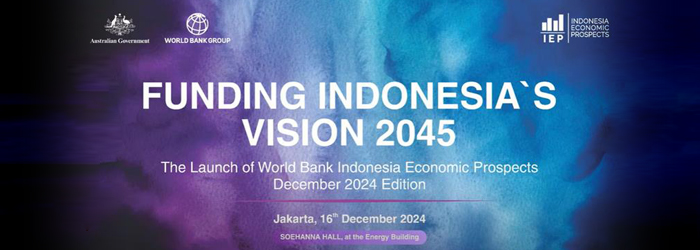เศรษฐกิจรายสาขา

The Launch of World Bank’s Indonesia Economic Prospects (IEP) December 2024 Edition was held on 16 December 2024 by the World Bank in collaboration with the Indonesian and Australian Governments. Gist as follows
1. About IEP
The Indonesia Economic Prospects (IEP) report is a bi-annual report, funded by Australian Government under the Australia-World Bank Indonesia Partnership (ABIP) five-year program. The report aims to provide a comprehensive analysis and impartial and up-to-date assessment of recent global and macroeconomic developments, outlook and risks, as well as specific development challenges for the Indonesian economy, to audiences like policy makers, business leaders, academic, think tank and the wider public.
The first part of IEP highlights key economic developments over recent months, and places these in a longer-term and global context. The second part of the report provides an in-depth examination of selected economic and policy issues, and analysis of medium-term development challenges. Full IEP report can be downloaded at https://shorturl.at/F1OkE.
2. Funding Indonesia’s Vision 2045 Seminar
In line with the IEP December 2024 edition, there was also a thematic seminar on “Funding Indonesia’s Vision - Increasing tax revenue to support Indonesia’s long-term goals”. Among keynote speakers and panelists were the Vice Minister of Finance of Indonesia, World Bank Country Director and Representative from Australian Embassy in Jakarta. Summary report is attached herewith. Gist as follows;
2.1 VMF
Indonesia strives to maintain a balance between growth, equity, stability, and sustainability, hence is committed to enhance the state budget (APBN) through three key strategies: (1) Collecting more - optimizing state revenue (2) Spending better - directed towards high impact sectors to foster economic growth and prosperity and (3) Promoting Innovative financing.
Ministry of Finance has implemented the new Core Tax Administration (CTA) system, which includes strengthening administrative policies, enhancing taxpayer services, improving business processes and regulations, as well as upgrading information technology. The CTA is expected to boost tax compliance and facilitate the interconnection and interoperability of information systems. Other measures conducted are managing shadow economic operations to extend the country’s tax base, devising excise duty authentication, and establishing a 12% VAT.
2.2 Aus Embassy
Indonesian Directorate General of Taxation and Australian Taxation Office have been working closely under the Prospera program – partnership for economic development (https://prospera.or.id). The cooperation includes evidence-based studies, exchanging
data on crypto assets, and assist DGT’s virtual assistant as well as transferring knowledge regarding tax technology system preparation and mass socialising.
2.3 World Bank
(1) Indonesia’s growth remains resilient, standing at 5% at the first three quarters of 2024, supported by high household demand and government spending, rapid services recovery and inflation moderation at 1.5% year-on-year. The growth is expected to remain strong and pick up slightly to 5.1% (y-on-y) in 2025 and 2026, whereas inflation is to increase from a low base, and the current account deficit to widen to 1.6% to GDP. Additionally, FDI share to GDP is expected to return to pre-COVID level and remain the largest source of external finance.
(2) One of the challenges that hinders Indonesia’s long-term growth vision is its tax collection inefficiency or tax gap. The tax gap is derived from the gap of the policy choices, the gap of the compliance challenges, as well as the existence of structural factors. World Bank thus recommends narrowing the said gap by addressing these interrelated challenges. Policy measures include lowering VAT and corporate income tax (CIT) registration thresholds, removing special regimes, and rationalizing tax incentives. To improve compliance, the World Bank suggests enhancing tax audit quality through the CTA system and clarifying VAT regulations. While doing so, expanding the reach, depth, and efficiency of the financial sector to support informal firms' access to financing is also important to address the structural constraints.






